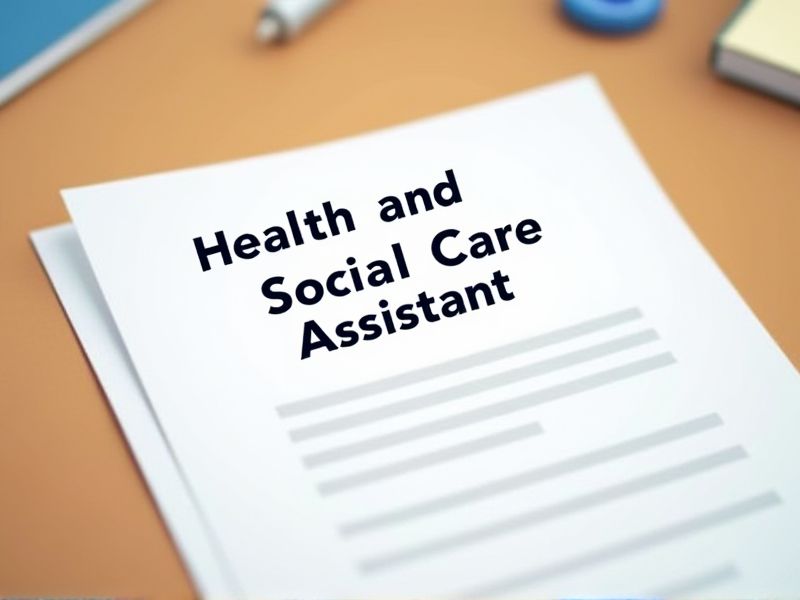
Health and Social Care Assistants often operate in environments where they must meet specific medical and ethical standards, necessitating foundational certifications. Certifications ensure that these professionals possess the necessary skills to provide safe, efficient, and empathetic care, reducing risks to both patients and providers. Regulatory bodies require evidence of qualifications to maintain a consistent quality of care and safeguard public well-being. These are some essential certifications required for a Health and Social Care Assistant.
First Aid and CPR Certification
First Aid and CPR certification equip health and social care assistants with the skills necessary to respond effectively to emergencies, potentially reducing the risk of serious injury or death. Certification ensures that assistants can provide immediate and competent care, maintaining patient safety and well-being. Employers in health and social care often require certification to comply with legal and regulatory standards. Being certified can boost confidence among patients and colleagues, fostering a sense of trust and professionalism in the care provided.
Manual Handling Certification
Manual handling certification is essential for health and social care assistants because it ensures they are equipped with the knowledge and skills to safely move patients, reducing the risk of injury. Certified individuals are better prepared to assess each situation's unique challenges, preventing harm to both themselves and those in their care. Proper manual handling techniques contribute to a safer working environment, which can lead to fewer workplace accidents and associated costs. Regulatory bodies often require certification to comply with health and safety legislation, ensuring that all personnel meet established standards.
Infection Prevention and Control Certification
Certification in Infection Prevention and Control is critical for a Health and Social Care Assistant because it enhances their ability to minimize the transmission of infections in healthcare settings, reducing patient risk. Having this certification means they are equipped with the latest knowledge and practices to effectively implement hygiene and sanitation protocols. With infections accounting for significant morbidity and mortality in healthcare environments, this certification ensures compliance with regulatory standards and improves overall care quality. In the wake of increased attention to infectious diseases like COVID-19, it underscores a commitment to maintaining a safe and healthy environment for both patients and staff.
Health and Safety Certification
Health and Safety Certification ensures that Health and Social Care Assistants understand protocols to prevent workplace accidents and injuries, which reduces risks for both staff and clients. Compliance with health and safety standards is often legally mandated for facilities to operate, making certification a requirement for employment. Certification educates care assistants on how to handle emergencies effectively, leading to quicker response times in critical situations. Professionals gain recognition and trust from employers and clients, enhancing their credibility and career prospects.
Safeguarding Adults Training
Health and Social Care Assistants often engage with vulnerable individuals, and safeguarding adults training equips them with the knowledge to identify signs of abuse or neglect effectively. This training builds competence in reporting and managing potential risks, ensuring that the needs and rights of adults are prioritized. Understanding safeguarding protocols fosters a safer environment for both the recipients of care and the caregivers. Legal and ethical obligations necessitate such training to maintain professional standards and compliance within the healthcare sector.
Confidentiality and Data Protection Certification
Health and social care assistants often handle sensitive personal and medical information, necessitating confidentiality and data protection certification to ensure compliance with privacy laws and regulations. Certification instills a comprehensive understanding of data protection protocols, reducing the risk of information breaches. This knowledge helps maintain trust between patients and care providers, critical for fostering effective care relationships. Certification also ensures that assistants are updated with evolving legal standards and industry best practices, essential in managing data responsibly.
Medication Administration Certification
Medication Administration Certification ensures that Health and Social Care Assistants can safely manage and dispense medications, reducing the risk of errors. Certification provides standardized training, enhancing the assistant's competence in understanding complex medication regimes. It is often a regulatory requirement in many health care settings to comply with legal standards and protect patient safety. Certification boosts trust and confidence among patients and healthcare teams in the assistant's ability to deliver proper care.
Mental Health Awareness Certification
Mental Health Awareness Certification equips Health and Social Care Assistants with necessary skills to recognize early signs of mental health issues, improving intervention efficacy. Recognition of mental health conditions ensures inclusive care, reducing potential stigma faced by patients. Providing informed support enhances overall patient well-being, which aligns with holistic care goals. Certification ensures compliance with industry standards, fostering trust in care environments.
Equality and Diversity Training
Equality and diversity training ensures that health and social care assistants can provide inclusive care by understanding and respecting individual differences. Without this training, unconscious biases could affect decision-making and patient interactions, leading to potential disparities in care quality. Legal obligations and organizational policies demand non-discriminatory practices, reducing the risk of legal issues and promoting a positive workplace culture. By equipping assistants with the necessary skills and knowledge, training enhances communication and relationship-building with patients from diverse backgrounds.
Dementia Care Certification
Dementia care certification ensures health and social care assistants possess the specialized knowledge to manage complex symptoms effectively. Training enhances communication skills, crucial for understanding needs and reducing agitation in dementia patients. Certified assistants are more adept at implementing evidence-based interventions, significantly improving patient outcomes. Certification also elevates trust and professionalism in care settings, fostering better relationships with patients and their families.
Summary
By obtaining certifications, you enhance your qualifications and increase opportunities for career advancement in health and social care roles. Certifications typically lead to improved confidence and competence, allowing you to deliver higher-quality patient care. Employers often recognize and reward certified professionals with better job prospects and potential salary increases. The acquisition of certifications may also foster professional growth and increase job satisfaction as you meet industry standards and expectations.
